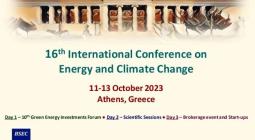We are taking a devastating risk with the green energy sector – one that might cost us our future
Relying on private companies to solve the climate crisis means that the planet’s fate rests in the hands of asset managers
We are living through perhaps the biggest and most important policy experiment in human history, without even being aware of it: we have been relying primarily on the private sector to put an end to the climate crisis. But this experiment increasingly looks like a mistake, and one that may cost us our planetary future.
To appreciate this, consider the global stock market. With stock prices now at all-time highs, it would be easy to assume that global business is uniformly buoyant. But look behind the headline figures and it becomes clear that while some industry sectors are flourishing, others are floundering. The cast of winners and losers throws up an irony that is significant and dreadful. One of the sectors where stock performance is worst happens to be one the world arguably needs to be best. That sector is clean, renewable energy, or what is more widely termed “green capitalism”.
Take the S&P Global Clean Energy Index, which measures the stock performance of leading companies in clean energy, especially solar and wind power. Since the beginning of 2021, this index has lost more than half its value. Champions of the sector waved this off as a teething problem. But now more than three years have passed. At what point does a temporary downturn become something more enduring, even endemic?
The main cause of this sluggish performance is low profitability. Bluntly stated, clean energy – developing and operating solar and windfarms, and selling the electricity they generate – simply isn’t a very attractive business. Returns are typically in the 5-8% range. Compare that with oil and gas production, where returns generally exceed 15%, and it’s little wonder clean energy stocks have been falling while oil and gas shares outperform. True, oil and gas companies receive state subsidies, but so do their clean-energy counterparts. The consequence of the sector’s abject performance is low investment in new solar and wind generating capacity. The only major country where investment in clean energy in recent years has been growing fast – let alone fast enough to potentially stave off catastrophe – is China.
Let us not be in any doubt about what is at stake in green capitalism’s difficulties. This is a problem of enormous, even existential, proportions. How so? Generally speaking, governments – again, putting China notably aside – have placed responsibility for “solving” the climate crisis squarely on the private sector. In particular, they have asked it to do the heavy lifting of substituting clean for dirty energy, with governments’ roles limited to providing incentives of various kinds, such as long-term revenue guarantees in the UK’s case, and tax credits in the US.
This, then, is the historic policy experiment that governments are conducting. Perhaps it would be better called a wager. Essentially, the world has bet the proverbial house on the private sector saving the day. The private sector is not seen as part of the answer. It is the presumed answer. But the private sector obeys the profit motive. Unless firms are forced to invest, limited profit opportunities and expectations usually mean limited investment. And in the context of electricity, limited investment in clean power in turn means that we will continue to rely on dirty energy sources – coal and gas – and hence CO2 emissions will continue to grow. And this is exactly what we are still seeing.
Of course, there are alternatives to relying so heavily on profit motives and private firms to tackle the climate crisis. Private companies can be instructed to invest. Compulsory production orders, whereby companies are legally compelled to prioritise the production of certain goods, have been widely used in wartime, for example. The struggle with the climate crisis is often likened to a war, so perhaps such orders should be considered. Or how about large-scale state financing, ownership and operation of clean energy resources? That’s what we see in China.
But across the west, let alone parts of the world where governments face far more severe fiscal constraints, the prospect of major public-sector investment in solar and wind power seems politically far-fetched, to say the least. Even relatively modest investments tend to fall foul of heightened concerns about government borrowing and spending. Meanwhile, the idea of forcing private firms to do anything flies against everything governments of our neoliberal age believe. And so we are left to hope that the private sector, nudged by suitable government incentives, will eventually shape up and deliver.
All of which raises another painful irony. Private-sector investment in clean energy is increasingly being undertaken by investment firms that many observers consider to represent capitalism’s least acceptable face: namely, asset managers such as the US’s BlackRock. We may not like the idea of having to hope that BlackRock and its peers are able to anticipate, and achieve, plump profits, but where clean energy is concerned, we had better get used to that idea. To one degree or another, the future of the planet hangs on it. If the choice is between, on the one hand, BlackRock thriving and clean energy rapidly displacing fossil fuels, and, on the other hand, BlackRock failing and clean-energy development also failing, then really the choice is not a hard one to make.
Cover photo: Photograph: Rob Arnold/Alamy



